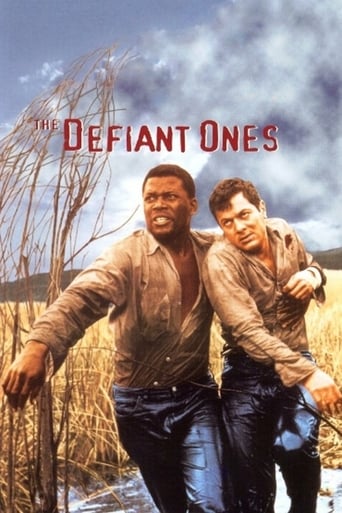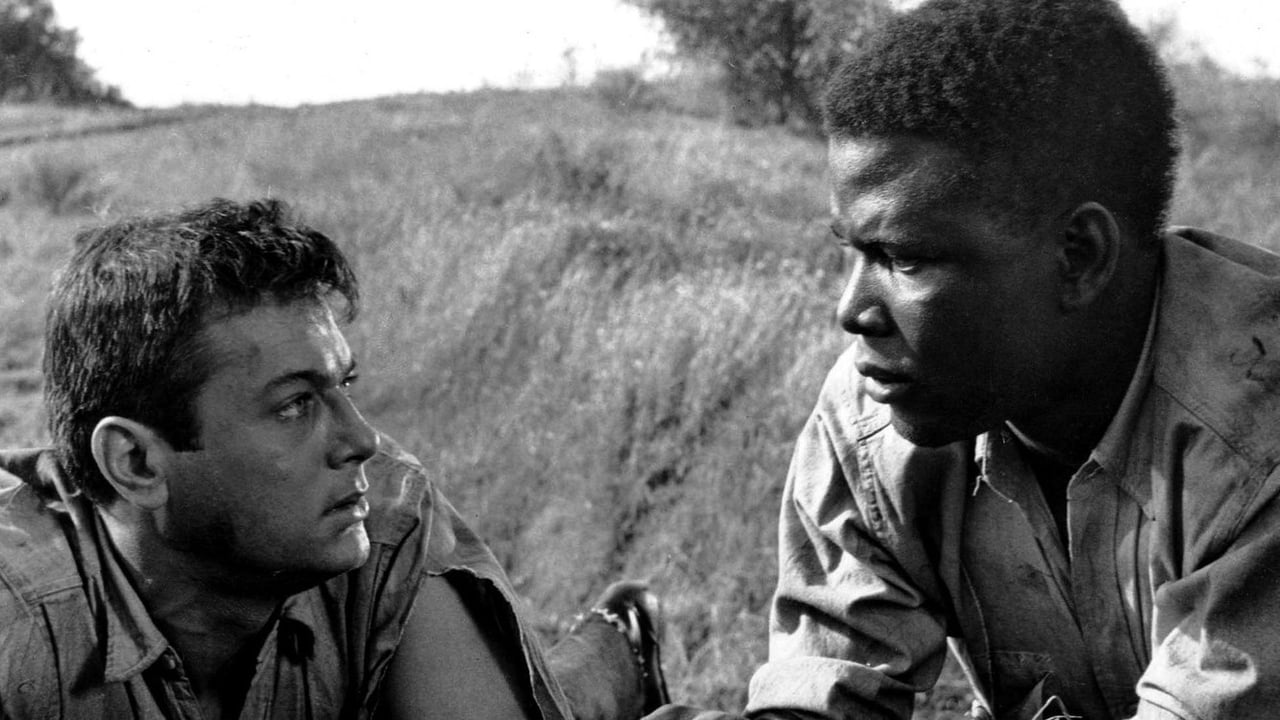HotToastyRag
There's a good chance you've seen a clip of The Defiant Ones interspersed into a montage of famous films. If you've seen Sidney Poitier and Tony Curtis chained together and running from bloodhounds, an angry mob, or alongside a train, those famous images are from Stanley Kramer's Oscar-winning drama.The plot is simple but intense. After a truck carrying a load of prisoners crashes and most of the passengers are killed, it's discovered that two have escaped: Sidney Poitier and Tony Curtis. They have a deep and bitter hatred of each other, but because they're shackled together at the wrist, they're forced to depend on and trust one another in order to survive.Both Sidney and Tony gave excellent, career-defining performances, and they were both nominated for Best Actor at the 1959 Oscars. Unfortunately, they were both beaten out by David Niven, whose role in the ensemble Separate Tables should have been included in the Best Supporting Actor category instead. The Defiant Ones was also nominated for Best Picture, Director, Editing, Supporting Actor for Theodore Bikel, and Supporting Actress for Cara Williams. It won for Cinematography and Original Screenplay, but when you watch the film, you'll be appalled that the two leads didn't bring home matching statues.If you haven't seen this classic, rent it this weekend and get ready for an extremely thrilling screening. It's difficult to make the entire running time of a film suspenseful, but this film is filled with emotional and physical conflict and keeps you on the edge of your seat from start to finish.
Claudio Carvalho
When the truck that is transporting convicts has an accident on the road, the inmates John "Joker" Jackson (Tony Curtis) and Noah Cullen (Sidney Poitier) that are chained to each other escape. They hate each other but they need to help each other to succeed in their intent of going north to jump in a train and reach freedom. Meanwhile the humane Sheriff Max Muller (Theodore Bikel) organizes a posse to track them down in a civilized manner and respecting justice. Joker and Cullen reach a small farm where a lonely woman helps them to get rid of their chains. She offers to driver her car with Joker and her son Billy while Cullen would escape through the swamp to the railroad. But when Joker learns that she sent Cullen to a trap, he leaves her and is shot in the shoulder by Billy. Joker seeks out Cullen to save him and when they meet each other, their former hatred has changed to friendship and respect. "The Defiant Ones" is an unforgettable anti-racism classic when the United States were openly racist. Stanley Kramer is responsible for two of the best anti-racism movies, "The Defiant Ones" and "Guess Who's Coming to Dinner", both with Sidney Poitier. Tony Curtis and Sidney Poitier have memorable performances. I would like to know how the reception of this movie from the audiences in 1958 was. My vote is eight.Title (Brazil): "Acorrentados" ("Chained")
ironhorse_iv
I was defiant to watch this movie by Stanley Kramer. The movie is the story of two escaped convicts, African-American Noah Cullen (Sidney Poitier) who hates white people, and bigot white man, John 'Joker' Jackson (Tony Curtis), whom hates blacks. Both men find themselves both shackled to one another after surviving a prisoner transport car wreck. Seeing a way to escape, both men travel the back roads eluding posses, cops, and the law on their quest for freedom. Both actors were able to get down and dirty for the role, but literally as most of the scenes have them lying down in dirt, mud, and rain. They are at first on each other throat, fighting against each other, but for them to survive. They are forced to put their issues away. This is where the characters try to relied on each other. After camping out and hearing out each other stories, the mood between them soften. They are help on the way by supporting characters such as Big Sam (Lon Chaney Jr.). Lou Chaney Jr, the Hungarian actor is wonderful in the role, as he able to sport the Southern accent as well, able to play somebody that isn't trying to be sinister. Too bad, he doesn't have much screen time or much to bring to the story. Another character they met on the way is the lonely, love-hungry widow played by Cara Williams, who offers to turn in Cullen if Joker will stay with her. Cara Williams is so love struck by Tony Curtis's character, that it's seems out of the blue for her to help one stranger after one day spent with each other, but Cara Williams does a great act as a desperate woman looking for escape by any means even trying to hook up with a inmate. She can be pity and hatred when view. By the time the two men are within hailing distance of a train that might take them to freedom, they have become friends somehow. Despite its pedigree — the film lacks screen time to explain more how the two main characters' antagonism will boil over and then cool into a forged friendship based on altruism and shared sacrifice. It's running time is only 97 minutes. Way too little for this character is suddenly become cool with each other. The whole film is way too short and focus on too long on cut aways with Sheriff Max Muller. (Theodore Meir Bikel) who was also nominated for the role, just doesn't give anything new to it. I also would love to hear some music score. The film lacks any music to give the movie any suspense, feeling or drama. It felt too good of a movie, not to have a film score. The ending will a downer, but it's works for the story. One of the biggest complains in the film is that some critics stated out that Sidney's character is a 'Magical Negro'. I don't see that at all, as Joker first come in the aid to Cullen when Cullen is stuck in the swamp, as well as having back story. Nor does Sidney character gives anything special insight to change Joker. It was the outside world and the supporting characters that change Joker. The scene where Sidney Poitier comforts Tony Curtis by holding his head in his arms is not made to look like Poitier's character was a servant to the the white man, at all. He did that to comfort his friend. The movie shows that Black or white we are all equal before the harshness of life. The movie is a good movie for teaching civil rights and racial tolerance. I think the theme of racism better and even more obvious in the foreground to make time this was filmed deliberately black-and-white. The movie is pretty gutsy for its era. It's a good watch, so check it out.
lasttimeisaw
The time of extreme racism has long gone, but this chained-together white and black convicts' escaping adventure simply hasn't waned much for its in-your-face impact of genuine thrill and sympathy, director Stanley Kramer's (from SHIP OF FOOLS 1965, 6/10) third feature, gathering Curtis and Poitier as the "impossible pair", the film would successfully pave the way for Poitier and Kramer's prospective Oscar-winner echelon and afford Curtis a splendid career-turn with his only Oscar nomination. One could easily be aware of the shooting condition since clearly Curtis and Poitier have taken their toll in their harsh fugitive surroundings, wrestling with the precipitate torrent, the mud pit under the pouring rain, a perilous marsh and finally a running train. But those are only default set pieces to sustain the film in its narrating procedures, a sharp and sound script does remind me how slowly the civilisation progress we have achieved since only 50 years ago, the world could be utterly colour-sensitive. Curtis and Poitier's two handers are meticulously orchestrated, but among the supporting group, Cara Williams and Theodore Bikel also obtained two Oscar nominations. The former partook in the latter half and induced the most poignant confrontation for Curtis' character, choosing between freedom (even love) and the brotherhood with a black prisoner (mercifully, the finale reciprocates with the same dilemma for Poitier). Meanwhile, Williams exhibits a dooming desperation out of the unsatisfied woman without being sidelined as a cipher in the plot. Bikel, is the Sheriff with a kind heart, whose gritty and congenial persona has re- established the integrity of the police force. Last but not the least, Poitier's a cappella rendition of W.C. Handy's "Long Gone (From Bowlin' Green)" has been repeated three times in the film, the beginning, the middle section (where they are caught by the village people) and the ending, precisely elevating the film's brio and set a great example of how a theme song could generate such an ineffable passion and evocation into a film's texture. ps: the film got two Oscars among its 9 nominations, BEST CINEMATOGRAPHY BLACK & WHITE and BEST ORIGINAL SCREENPLAY.


 AD
AD






